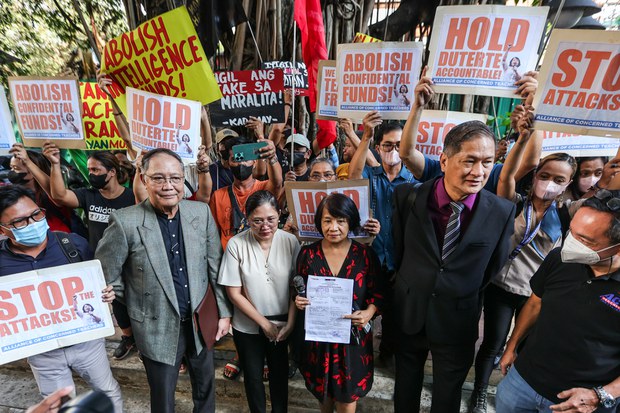In complaint, Philippine congresswoman accuses ex-President Duterte of making death threat
2023.10.24
Manila
 Surrounded by supporters, Philippine Rep. France Castro (center) holds a copy of the complaint she filed against former President Rodrigo Duterte at the Quezon City Prosecutor’s Office, Oct. 24, 2023.
Surrounded by supporters, Philippine Rep. France Castro (center) holds a copy of the complaint she filed against former President Rodrigo Duterte at the Quezon City Prosecutor’s Office, Oct. 24, 2023.
An opposition congresswoman filed a criminal complaint Tuesday against ex-Philippine President Rodrigo Duterte for making a death threat against her during a television program this month.
Rep. France Castro called Duterte’s statement both baseless and malicious. The former president specifically named the congresswoman during a show he hosted on Oct. 11 and that was broadcast from southern Davao city, his political power base.
“He must be held accountable for the serious threats to my life,” Castro told reporters.
During the program, Duterte defended his daughter, Vice President Sara Duterte, who was being questioned during a congressional inquiry over her use of state funds that she had sought to keep confidential.
Castro had questioned the allocation of 650 million pesos (U.S. $11.4 million) in funds for the Office of the Vice President and the Department of Education’s offices, both of which Sara Duterte oversees.
While on air the former president urged his daughter to be straightforward with lawmakers, particularly with Castro, about the necessity of “confidential funds” to combat the communist insurgency.
“But your first target there, using your intelligence funds, is you, France, you communists who I want to kill,” Duterte said, according to transcripts made public. “I asked her (Sara Duterte) to tell them that, but she refused, saying, ‘You know Pa, if I did that, they might harass the PMTs (Philippine Military Training institutions).’”
House members, including those allied with the Dutertes, eventually removed the confidential funds and realigned them to agencies protecting Philippine-claimed waters in the South China Sea.
The video has since been deleted from Sonshine Media Network International, the broadcast arm of televangelist Apollo C. Quiboloy’s Kingdom of Jesus Christ, but Castro and other Duterte critics have managed to save it.
Quiboloy, a Filipino identified as Duterte’s pastor, has been sanctioned in the United States over allegations that he raped women and girls at the sect that he founded.
Castro, who advocates for social issues including transparency in how politicians use public funds, said she feared that Duterte’s “threats were genuine and posed a risk to her life, liberty and security.”
Her complaint seeks redress for these “grave threats.” If Duterte is found guilty, he could face imprisonment for up to six months and a fine that would be set by the court.
She said she lived “in constant fear that I will be a victim of such extrajudicial killing, forced disappearance, illegal arrest or detention that he repeatedly admitted having perpetrated in the past.
“Though factually baseless and clearly malicious, I cannot merely dismiss respondent Duterte’s red-tagging and accompanying grave threats as either figurative, joking or otherwise benign,” Castro said.
Red-tagging refers to baselessly accusing someone of being a communist sympathizer.
“The threat was not made to any condition and it was committed using information and communication technologies,” she said.
Critics have said Duterte’s threats should not be taken lightly, considering that more than 8,000 suspected drug addicts and dealers were killed during his term as president from 2016-2022 according to government figures.
International charges
Duterte also has two complaints before the International Criminal Court.
One was filed by a former police officer and a self-styled assassin who accused Duterte of ordering the deaths of opponents and criminals when he was mayor of of Davao. The second was filed by relatives of people killed during the presidential counter-narcotics campaign.
Duterte once told police that he would protect them from prosecution if they were charged, as long as the deaths occurred while they were performing their mandate as law enforcement officers.
The former president’s lawyer, Salvador Panelo, said Duterte’s statement was not a threat, adding he was only expressing his intent to kill.
“It does not even refer to her, so what is the basis for the complaint? Are you the offended person,” Panelo said.
“But the alleged offender does not refer to you. It refers to the general class of people who wanted to destroy the state,” he said.
Last week, House members called out Duterte for the threat, saying they took “utmost exception” to his remarks.
“Our institution, the House of Representatives, has been unwavering in its dedication to the Filipino people. It is deeply unfortunate that the former president chose to malign the very institution that for years supported many of his own legislative priorities,” they said in a statement.
Tony La Viña, a lawyer and founding president of local group Movement Against Disinformation, said that while freedom of speech must be acknowledged in a democratic country, Duterte should not be allowed to blatantly flout the law.
“He threatened the life of a person … on national TV, on social media,” he said, stressing that Duterte was no longer immune from lawsuits because he is no longer president.
“This is the first time we’re holding President Duterte accountable for his actions in a Philippine court,” he said.
Jeoffrey Maitem and Dennis Jay Santos in Davao City, Philippines, contributed to this report.







